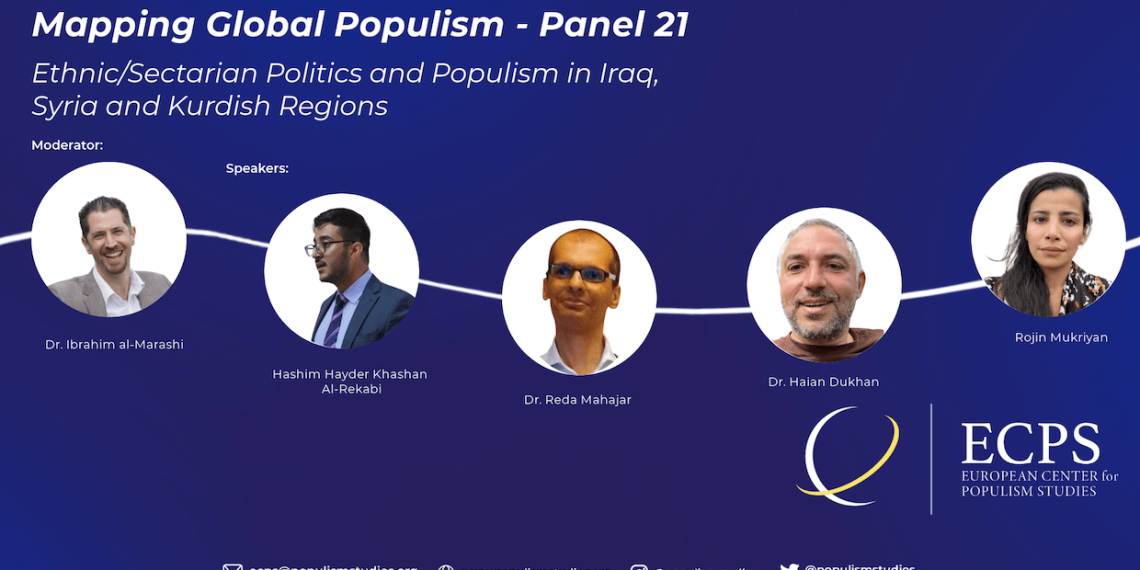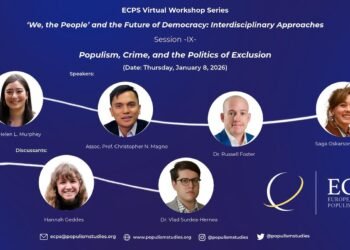Please cite as:
Stamoglou, Anastasia. (2025). “The Sectarian Populist Playbook: Populism in Iraq, Syria, and Kurdish Regions.” European Center for Populism Studies (ECPS). May 29, 2025. https://doi.org/10.55271/rp0099
This report presents the key insights from the 21st session of the Mapping Global Populism Panel Series, hosted by the European Center for Populism Studies (ECPS). Focused on Iraq, Syria, and the Kurdish regions, the panel examined how populism operates through ethnic and sectarian divisions in societies marked by authoritarian legacies and conflict. Drawing on political theory, field data, and comparative case studies, the session revealed how authoritarian leaders adapt populist strategies to manipulate communal fears, centralize power, and erode democratic institutions.
Report by Anastasia Stamoglou
Introduction
The 21st session of the Mapping Global Populism Panel Series, titled “Ethnic & Sectarian Politics and Populism in Iraq, Syria and Kurdish Regions,” brought together scholars to examine the complex interplay between populist politics and identity-based cleavages in some of the Middle East’s most conflict-affected contexts. Organized by the European Center for Populism Studies (ECPS) and moderated by Dr. Ibrahim al-Marashi (Associate Professor of History, California State University), the panel focused on how populist leaders and movements in Iraq, Syria, and Kurdish regions instrumentalize ethnic and sectarian divisions to sustain power, suppress opposition, and assert exclusionary visions of national belonging.
Featuring contributions from Dr. Reda Mahajar (Research Fellow at The Conflict Analysis Research Centre (CARC) at the University of Kent), Hashim Hayder Khashan Al-Rekabi (Lecturer, University of Baghdad), Dr. Haian Dukhan (Lecturer in Politics & International Relations, SSSHL Department of Humanities and Social Sciences, Teeside University), and Rojin Mukriyan (PhD candidate in the department of Government and Politics at University College Cork, Ireland), the session offered a timely and critical interrogation of memory, fear, gendered politics, and identity formation within the frameworks of populism and authoritarian governance.
Populism and Sectarian Calculations in Iraq and Syria
The panel opened with Dr. Reda Mahajar’s incisive critique of Bashar al-Assad’s regime in a presentation titled “Syrian Sunni Jihadi Chickens Come Home to Roost.” Dr. Mahajar argued that Assad’s support for Sunni jihadist elements in Iraq from 2003 to 2010 was not only deliberate but strategically framed to undermine the US occupation by making Iraq ungovernable. This short-sighted geopolitical gambit, he contended, ultimately backfired. The networks Assad helped empower, most notably al-Qaeda in Iraq, mutated into ideological and military adversaries, including Hay’at Tahrir al-Sham, which would go on to play a central role in Syria’s civil war.
Dr. Mahajar emphasized the historical irony in Assad’s strategy: a secular Alawite regime that presented itself as modern and pluralistic nonetheless perpetuated a Sunni-centric educational framework that reinforced sectarian binaries. These state-sponsored narratives later became fertile ground for jihadist mobilization. By embedding sectarian discourse into national identity, Assad’s regime unwittingly cultivated the ideological terrain upon which its own enemies would rise. The case stands as a stark example of blowback: a regime’s instrumental use of sectarianism ultimately incubated the forces that would threaten to dismantle it.
Expanding on the dynamics of populism in Iraq, Hashim Hayder Khashan Al-Rekabi traced three waves of populist discourse since 2003. The first phase, from 2003 to 2014, was marked by sectarian populism, as Shia, Sunni, and Kurdish parties capitalized on identity politics and the muhasasa (power-sharing) system to consolidate ethno-sectarian blocs. This period saw the institutionalization of communal divisions, with political legitimacy grounded in confessional affiliation rather than policy performance.
The second phase, from 2014 to 2019, saw the rise of anti-establishment populism. Figures like Muqtada al-Sadr employed anti-corruption rhetoric and attacked state institutions, despite being deeply embedded within them. Al-Rekabi noted the paradox of elected officials publicly denouncing the very parliament or ministries they served in, a strategy that blurred the line between opposition and governance. The final phase, emerging after 2019, introduced what he termed “illiberal democracy,” a context in which populist leaders, including al-Sadr, leverage democratic processes not to deepen pluralism, but to centralize authority and marginalize dissent.
Interestingly, Al-Rekabi shared findings from field research indicating that approximately 70% of Iraqis associate democracy not with institutional pluralism or civil liberties, but with the delivery of basic services. This utilitarian understanding of governance fuels nostalgia for authoritarianism and strongman rule, suggesting that democratic legitimacy remains fragile and conditional in post-2003 Iraq.
Kurdish Populism and the Tension Between Ideals and Institutions
Turning to the Kurdish context, Ms. Rojin Mukriyan offered a comparative analysis of populist dynamics in Rojava (northeast Syria) and the Kurdistan Regional Government (KRG) in Iraq. Drawing on Ernesto Laclau’s theory of populism as a discursive construction of “the people” against “the elite,” Mukriyan argued that the Democratic Union Party (PYD) in Rojava exemplifies left populism through its use of unifying signifiers such as “democracy” and “gender equality.” In contrast to conventional state-building models, the PYD’s project, grounded in Abdullah Ocalan’s theory of democratic confederalism, seeks to transcend national borders and ethnonationalist frameworks by promoting decentralized, pluralistic governance.
In Rojava, populism is not merely oppositional but visionary. Its aim is to unite a multi-ethnic coalition including Kurds, Arabs, Assyrians, and others under a shared commitment to local autonomy and egalitarian principles. Mukriyan acknowledged, however, the criticisms of Rojava’s ambiguity and contradictions, especially from within libertarian and anarchist circles who question its simultaneous engagement with state actors like the Assad regime.
By contrast, the KRG in Iraq presents a case of populism devoid of transformative ambition. The dominant parties, the Kurdistan Democratic Party (KDP) and the Patriotic Union of Kurdistan (PUK), continue to operate through clientelist networks and dynastic leadership. Their governance reflects a neoliberal, exclusionary model in which dissent is stifled, and party loyalty is rewarded with patronage. Mukriyan noted that while the rhetoric of reform occasionally surfaces (i.e. during election campaigns) these promises rarely materialize into structural change. The result is a hollowed-out democracy where elite families maintain control, replicating the very state-centric authoritarianism they once opposed.
Memory, Fear, and Sectarianism Among Syrian Christians
Dr. Haian Dukhan’s pre-recorded presentation focused on Christian communities in al-Hasakah, Syria, offering a layered analysis of sectarianism from both “above” and “below.” He argued that Assyrian and Syriac Christians in this region are shaped by collective memory and historical trauma including genocide, marginalization, and displacement. These long-standing fears were reignited during the Syrian civil war, particularly by ISIS’s attacks on Christian villages.
In response, some Christian groups aligned with the Assad regime and joined militias like Sutoro, seeking protection through militarized solidarity. Dr. Dukhan labelled this phenomenon as “sectarianism from below,” a grassroots survival response driven by existential anxiety. Simultaneously, the Assad regime manipulated these fears to reinforce its legitimacy, portraying itself as the only viable guardian of minority rights. This elite-driven manipulation, or “sectarianism from above,” not only entrenched dependency but also deepened mistrust among Syria’s diverse communities. Dr. Dukhan’s analysis underscores how authoritarian regimes weaponize identity and trauma to fragment civil society and maintain control.
Conclusion
Across the cases discussed, three common themes emerged. First, both Iraq and Syria illustrate how populist strategies become institutionalized through sectarian quotas and identity-based governance structures. The muhasasa system in Iraq and the sectarian entrenchment in Syria formalize the very divisions that populists exploit, making political reform deeply challenging. Second, authoritarian leaders in the region have proven adept at adopting the language of populism. Figures like Bashar al-Assad and Muqtada al-Sadr, while operating in different systems, share a similar rhetorical playbook: portraying themselves as defenders of the majority identity against both foreign enemies and domestic “elites.”
Finally, the Kurdish case highlights the limits and possibilities of populist governance. Rojava’s model of inclusive left populism contrasts starkly with the KRG’s elite-dominated politics, raising important questions about the viability of democratization within nationalist movements. Yet even Rojava is not immune to the contradictions of populist nationalism, particularly when faced with geopolitical constraints and regional authoritarian pressures.
Follow-Up Questions
The panel concluded with several pressing questions that warrant further exploration:
- Can Rojava’s decentralized, inclusive governance model inspire institutional reform in the hierarchical, patronage-driven structures of the KRG?
- How do external powers such as Turkey and Iran exacerbate or manipulate ethnic and sectarian populism, and how does their influence compare to Russia’s populist interventions in Europe?


